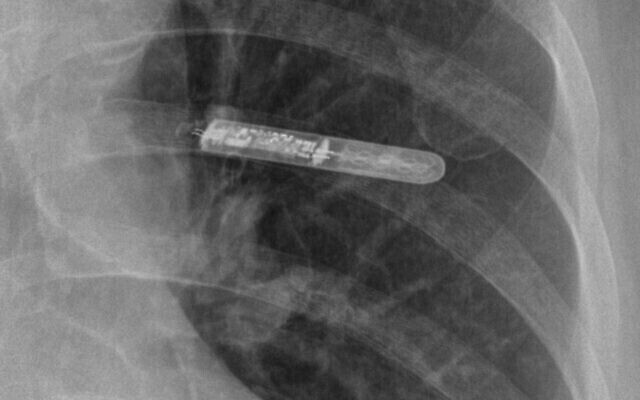Questions swirl about PM’s health
Netanyahu underwent “a series of comprehensive and routine examinations” including a heart exam, “all of which came out completely normal". The offficial medical diagnosis was dehydration.

(Times of Israel) – Moments after Prime Minister Benjamin Netanyahu was discharged from the hospital on Sunday morning following an overnight stay for what his office said was dehydration monitoring, questions quickly surfaced about the premier’s overall health after the hospital announced that he was fitted with a subcutaneous heart monitor.
The prime minister arrived at the Sheba Medical Centre in Ramat Gan on Saturday afternoon and was hospitalised later in the evening for apparent dehydration and to undergo medical observation. According to Hebrew-language media reports, the premier was admitted to the hospital’s cardiology department.
A joint statement from the Prime Minister’s Office and Sheba on Saturday said that Netanyahu complained of dizziness after spending several hours in the sun at the Sea of Galilee on Friday amid an intense heatwave across the country. He was brought to the hospital on Saturday by convoy from his home in Caesarea, where he was spending the weekend. He was said to be fully conscious and walking without assistance.
The Haaretz and Walla news sites reported that Netanyahu had lost consciousness at home. However, this was not addressed in a video the prime minister recorded at the hospital on Saturday night where he said he was feeling “very good,” or in any formal statement from Sheba. An unsourced Channel 12 news report on Saturday said Netanyahu had complained of chest pains before he was taken to the hospital.

On Sunday morning, the hospital said that Netanyahu underwent “a series of comprehensive and routine examinations” including a heart exam, “all of which came out completely normal,” and that the official medical diagnosis was dehydration.
In a statement Sunday issued by Prof. Amit Segev, director of the cardiology unit and president of the Cardiology Association in Israel, the doctor said that the prime minister’s heart was healthy and that “an electrical test of the heart…came out completely normal.”
“At no point was any heart arrhythmia [irregular heartbeat] found,” the Segev assured.
However, Segev also mentioned that the hospital decided to implant a subcutaneous heart monitor, called Holter, “as is customary” to “allow the close medical professional team of the prime minister to continue regular monitoring.”
The medical device is implanted into the chest area to monitor and record heart activity for a period of several years.
Amid the swirling speculations, the hospital on Sunday night rejected assertions that officials were keeping important information from the public about the 73-year-old prime minister’s heart health and the reason for his hospitalization, according to a Channel 12 report. The hospital said it ran a great number of tests that came back normal and that the heart monitor was just for precaution, the report said.
A customary procedure?
The Times of Israel asked Prof. Shaul Atar, director of the cardiology department at Galilee Medical Centre in Nahariya, to explain why a long-term heart monitor would be implanted in the prime minister’s chest if his heart is completely healthy, and whether such a procedure can be characterised as “customary.”
“I don’t have all the information on his physical situation, but as far as I understand, he probably fainted at home due to syncope,” Atar said.
Syncope, or passing out, occurs when there is not enough blood flow to the brain. The condition is generally caused by an imbalance of the parasympathetic and sympathetic nervous systems. Syncope is transient in many cases and has a variety of causes, including dehydration.
Pre-syncope is the feeling you are about to faint, and can involve dizziness and light-headedness.
“Once a neurological cause is ruled out by CT or MRI, then the likely cause for the fainting would be some kind of heart rhythm disturbance, or what we call a cardiac block. In many cases, it’s benign, but it needs to be checked,” Atar said.
He explained that as reported, Netanyahu underwent an electrophysiological (EP) study to see if this was the case. The study involves a heart catheterisation that goes into the right side of the heart and measures intervals of electrical conduction between specific points in the heart’s conduction system.
“You want to know whether the conduction times are normal or too long. If they are too long then that means that there is something wrong. The electrical conduction system is too slow,” Atar explained.
“Sometimes this is fixed by the insertion of a pacemaker [to regulate the electrical signals]. They did not give the prime minister a pacemaker, but it doesn’t exclude completely the possibility that he had some kind of a transient block,” he suggested.

In October, Netanyahu was hospitalised at Jerusalem’s Shaare Zedek Medical Centre after feeling unwell during Yom Kippur synagogue services. He was released the next morning after undergoing exams and remaining overnight for observation.
According to Atar, the premier may have experienced pre-syncope or syncope in October, as well. Therefore — although his doctors did not insert a pacemaker this weekend — they may have decided that it was worth continuously monitoring the electrical signals in his heart.
Heart monitoring
There are three options for monitoring a patient’s heart outside the hospital or doctor’s office. The first is an external Holter monitor, a walkman-size portable electrocardiogram that a person wears for 24-72 hours. The monitor records the electrical activity of the heart via electrodes stuck to the person’s chest and abdomen, which are connected to the monitor by cables.
The second is a cardiac event recorder, which is also known as an event loop recorder. Like the Holter monitor, it is worn externally. The difference is that the cardiac event recorder has transmission capability.
“Let’s say you feel dizzy. You press the button, which transmits to someone looking at a screen, who will see your heart rhythm. They will know exactly what is going on with you — whether you have either tachycardia [a faster than normal heart rate] or bradycardia [a slower than normal heart rate, whether you have some kind of an arrhythmia or not,” Atar said.
Netanyahu received the third type of heart monitor, called an implantable loop recorder (ILR). An ILR is a rectangular one-to-two-inch metal device resembling a flash drive containing an electrical circuit and a battery. It is inserted subcutaneously into the left chest area and works for two-to-three years.
The ILR keeps track of the heart rate and heart rhythm and automatically generates recordings of any abnormal electrical activity. It saves the information and can send it to the patient’s cardiologist. The ILR comes with a hand-held activator synched to the implanted device so that the patient can prompt the device to record data if they feel symptoms.
“It’s a long-term device, and it’s very easy because it doesn’t disturb your daily activities. You can run with it. You can fly. You can shower with it. You can do anything you would normally do,” Atar said.
“It can stay there for years. Sometimes even after the battery runs out, people just leave it for decades,” he noted.
Atar said he doubts that Netanyahu suffered a simple case of dehydration. Rather, it was likely that this past weekend was not the first time that he had an occurrence of syncope and that his physicians decided it was time to keep a closer eye on things with the ILR.
“They need some definitive answers to know why he was dizzy or fainted. However, it is important to keep in mind that neurocardiogenic syncope is mostly a very benign situation and may happen infrequently. If that is the case, it doesn’t require any interventions like a pacemaker or drugs,” Atar said.

comments